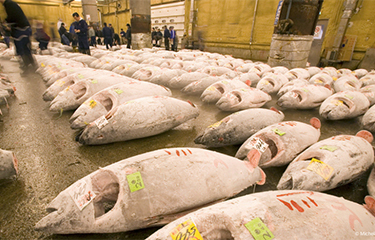Japan’s Diet, its national legislature, passed a law on 4 December to ban the importation of illegal, unreported, and unregulated (IUU) seafood.
The new law will require records on catches and transfers to be gathered and submitted to the government in order to establish traceability. For imports, a “certificate of legal catch” from a foreign government will be required.
The translated title of the new legislation is the “Domestic Trade of Specific Marine Animals and Plants Act.” The act still needs to be fleshed out over the next two years by bureaucrats, who will convert them into formal regulations. Several points remain to be developed, including selecting species to be covered based on fair and clear criteria, reducing the workload of operators, enhancing traceability through electronification of data, and collaboration with other countries regarding acceptability of national certifications.
The government has received input on IUU issues from the Anti-IUU Forum Japan, a grouping of several NGOs active in promoting sustainable fisheries. This group consists of WWF Japan, Seafood Legacy Co., The Nature Conservancy, Sailors for the Sea Japan, Environmental Defense Fund, and GR Japan K.K.
After the law's passage, the group issued a joint statement applauding the move, noting that this now brings Japanese law in line with the European Union and the United States. The E.U. established its EU IUU Regulation in 2010, and the U.S. Seafood Import Monitoring Program was initiated in 2018.
WWF Japan Seafood Market Manager Yukihiro Misawa said the law represented a major advance in the country's efforts to recognize and combat IUU fishing.
“As a member of the committee on catch documentation schemes called by the Fisheries Agency of Japan, I participated in many discussions on the establishment of a new scheme over the past ten months,” Misawa said. “I would like to welcome the enactment of this new law to regulate international and domestic trade of seafood sourced by IUU fishing. Japan has great roles and responsibilities to end IUU fishing globally and pass on bountiful oceans for future generations.”
While the Anti-IUU Forum Japan acknowledged that all species will likely be covered initially, it called those species especially vulnerable to IUU fishing (including tunas, crabs, eels, flounders, squids and cuttlefish, in the case of imported seafood) be immediately included under the law once it goes into effect.
Furthermore, it is proposing three specific actions regarding the law's implementation: a system in which catch identification numbers and data linked to them are stored in a central database; information-sharing to be allowed when required and established through collaboration with existing efforts for “smart fisheries"; and alignment with the E.U. and the U.S. regarding items to be included in catch documentation that will be required for imported seafood.
Scholars from the Stimson Center, a Washington, D.C., U.S.A.-based security think-tank, provided advice and support to the Japan Anti-IUU forum, and to the Japanese Ministry of Agriculture, Forestry, and Fisheries as it crafted the new law. Sally Yozell, director of the Stimson Center’s Environmental Security Program, told SeafoodSource the Japanese model is a hybrid of the U.S. and European models.
“The U.S. model looked at species at risk of being IUU and narrowed it down to 13 species, and the hope is that they will eventually cover all species. And it’s a similar effort in Japan,” Yozell said.
The E.U. program differs from the others, as it applies to all species.
“The E.U. program, on the other hand, requires catch certification. Countries that export to Europe must certify that their fish going to Europe is not IUU. The Japanese program will take that catch certification by the country, so that’s the European part,” she said.
Yozell said since the U.S. program was established, the country has moved more toward an electronic system, and she expects that the U.S. – as well as the E.U. – will help Japan to develop an electronic system to provide better traceability and prevent falsification of records.
“The U.S. is also turning to AI in the next phase of trying to be able to catalog more data and information of what’s coming in, to do analysis, and I think that over time Japan will move to that same sort of system,” she said. “Europe, the U.S. and Japan make up between 50 and 60 percent of the global market. That does put a lot of pressure, and the hope is that the other big fishing countries – China, Taiwan, South Korea – will be forced to create a similar seafood traceability program.”
Marta Marrero Martin, the ocean governance director at The Nature Conservancy, said Japan's move will put increased pressure on those involved in IUU fishing.
“This new legislation marks a historic moment in the global fight against IUU fishing. Japan joins the E.U. and the U.S.A. in sending a clear and strong message to illegal operators, who will now have great difficulty in finding an entry point for their illegal products in the world’s three largest seafood markets," Marrero Martin said. "As a member of the IUU Forum and the E.U. IUU Coalition of NGOs in Europe, we celebrate this milestone.”
Sailors for the Sea Japan President Minako Iue said the law represented a watershed moment for Japan's seafood sustainability-focused NGO community.
"We would like to continue our support to contribute to awareness raising among various stakeholders – from fishermen to consumers – to enable fisheries industries to become growing industries and to realize sustainable seafood consumption," Iue said.
Photo courtesy of WWF Japan







